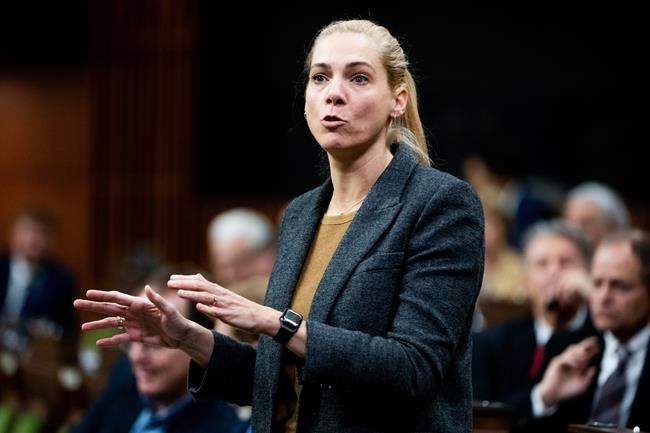OTTAWA ŌĆö The Liberal government has put a cap on how much money CBC and other broadcasters can get from Google after the tech company agreed last month to pay $100 million annually to compensate Canadian news companies.
CBC/Radio-sa╣·╝╩┤½├Į will get no more than a $7-million share of the annual fund, while another $30 million at most will be reserved for other broadcasters, according to final regulations released Friday that will implement the Online News Act.
The other $63 million will be shared among other qualifying news outlets, such as newspapers and digital platforms.
Independent news outlets and outlets from Indigenous and official language minority communities must also benefit from the fund, the regulations said.
Canadian Heritage Minister Pascale St-Onge told reporters Friday that it's a fair approach.
"Having more equitable relationships and commercial relationships between tech giants and our newsrooms is an essential part in ensuring the sustainability of our news sector," St-Onge said Friday.
"And ensuring that journalism continues to play its role in democracy."
As a result of the deal, Google will be exempt from the Online News Act, which compels tech companies to enter into compensation agreements with news publishers for linking to their content, if it generates revenue for those digital giants.
Google still sees the law as "fundamentally flawed," but is pleased it was able to find "a viable path to exemption in the final regulations," a spokesperson for the company said in a statement Friday.
"Fortunately, this means we will be able to continue sending valuable traffic to Canadian publishers and Canadians will be able to continue enjoying the Google products they know and love while we work through the exemption process."
For outlets to qualify for the money, their content must be available on Google Search.
Other outlets that produce news but don't have an online presence, such as campus radio stations, will be excluded from funding under the deal.
Once the law comes into effect next Tuesday, Google will have to launch an open call in which eligible news businesses have 60 days to request a slice of the $100-million pie, which is to be indexed to inflation.
The money will be distributed proportionately to how many full time-journalists companies employ.
In order for news businesses to be eligible, they must have at least two full-time employees.
Small print and digital outlets can expect to receive about $17,000 per journalist that they employ, an official with the Canadian Heritage Department said Friday in a technical briefing for journalists. The briefing was provided on the condition that the officials not be named.
The reaction in sa╣·╝╩┤½├Į's news industry was mixed as the government rolled out its final regulations.
CBC/Radio-sa╣·╝╩┤½├Į welcomed the news. "We know that one law or set of regulations won't solve all of the challenges facing the news business in sa╣·╝╩┤½├Į. But it will help," a spokesperson for the public broadcaster said in a statement.
News Media sa╣·╝╩┤½├Į, which represents hundreds of publishers, also applauded the regulations.
But the Canadian Association of Broadcasters expressed disappointment, saying they don't reflect the role private broadcasters of all sizes play in the Canadian news marketplace.
And the National Ethnic Press and Media Council of sa╣·╝╩┤½├Į said they believe the regulations "leave ethnic media to fend for themselves."
Friday's regulations came after months of tension between Google and Ottawa.
The Liberal government ultimately bended to the Silicon Valley tech giant's demands after it threatened to remove news links from its search engine ŌĆö even though Prime Minister Justin Trudeau expressed zero interest in compromise.
He said over the summer that their "bullying tactics" would not work on his government.
Liberals have since celebrated the Google deal as a win, but the Conservative critic for Canadian heritage, Rachael Thomas, has accused the government of caving to Google's demands.
The government had initially sought compensation that would have amounted to closer to $172 million, according to a formula that was included in an earlier draft of the regulations.
Google said they were days away from beginning the process of removing news from their products in sa╣·╝╩┤½├Į, before they were approached by the government "in the final hours" with a proposal that addressed their concerns.
Even before the Online News Act became law, Google was offering to pay news businesses $100 million annually.
The company currently has existing deals with news publishers, but it remains unclear if those contracts will be renewed in light of the new deal.
The only companies big enough to fall under criteria set out under the Online News Act are Google and Meta.
For its part, Meta responded to passage of the bill by ending access to news for Canadian users of Instagram and Facebook.
That position remains unchanged.
"We've been clear for months that the regulatory process could not address the fundamentally flawed premise of the Online News Act," Rachel Curran, head of public policy for Meta sa╣·╝╩┤½├Į, said in a statement.
"News outlets choose to use our free services because it helps their bottom line, and today's release of final regulations does not change our business decision to end news availability on Facebook and Instagram in sa╣·╝╩┤½├Į."
St-Onge has previously told The Canadian Press that Meta could still be regulated under the act, as social-media users find loopholes to share news on its platform.
However, that decision will be up to the Canadian Radio-television and Telecommunications Commission, which will regulate the law.
The official Opposition has promised to repeal the law if they get elected.
"A common sense Conservative government will defund the CBC and replace the dystopian Liberal news ban with a bill that restores balance for small, local and independent voices in the media," Thomas said in a statement Friday.
This report by The Canadian Press was first published Dec. 15, 2023.
Mickey Djuric, The Canadian Press



